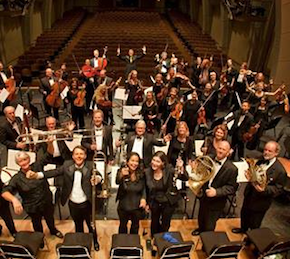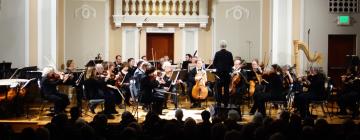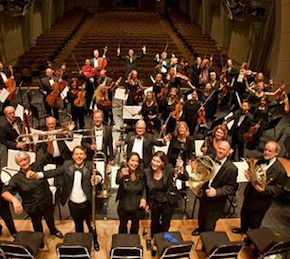
British conductor, early music specialist, and Handel expert Paul Goodwin (b. 1956) is in his third year as director and conductor of the Carmel Bach Festival. When he started in 2011, he instituted the so-called Carmel Commission, a new musical composition that is related to the music of J.S. Bach, written by a composer with a strong link to the U.S.
“A composer has to write in a textural way that suits the Festival and our style of concerts, in which we use early music techniques”, says Goodwin on the phone in between festival rehearsals. After John Corigliano and Curt Cacioppo, he asked Scottish composer Thea Musgrave (b. 1928) for this year’s commission, which will be performed during the opening concert on Saturday, July 13, together with music from J.S. Bach, George Frederic Handel, and Gabriel Fauré.
“People asked me why I chose a Scottish composer, when in fact she lives in Playa del Rey, just outside of Los Angeles, and she works and teaches in this country. As a California resident, she was a perfect match for what we are doing at the Festival,” says Goodwin. “She has dual citizenship, but she is very Scottish. She is 85 years young, extraordinarily energetic, and belongs to the next generation of older, amazing, craftsman composers that came after Elliot Carter. Musgrave is an international name, but not so well known in this country. That is another reason why I wanted to highlight her work.”
“I have commissioned a piece from her before, in 2004, when I was Principal Guest Conductor at the Academy of Ancient Music. She wrote Journey into Light, a beautiful dark-colored piece for soprano and orchestra that I loved,” says Goodwin. “Thea Musgrave is a consummate craftswoman. Her music is very beautifully written and with such detail.”
“I like transformational programming, programs that develop. The festival’s opening concert follows a journey from darkness to light.” – Carmel Bach Festival Director Paul Goodwin.
Musgrave’s new composition is called Largo in Homage to B.A.C.H. In the ‘Composer’s Note on her website she writes:
My very first idea was to use the BACH initials as a basis for the work: not as a melodic motif that has often been used by composers, but rather as a harmonic structure. This is possible because in German the B stands for B-flat and the H stands for B-natural. This led to the thought that there would be four short sections, each led by a different soloist, forming an emotional journey: Lamentoso (mournful), Ardente (fervent), Inquieto (restless) and Sereno (peaceful).
“We have only sight-read through the piece once so far,” says Goodwin, “and it is a sort of journey from darkness into the light.”
“The first section is characterized by a solo double bass, the second one by a solo cello, the third one solo viola, and the final one, rather like [Vaughan Williams’] The Lark Ascending, by the violin. Musgrave uses a very beautiful, coloristic cluster technique for the overall atmosphere of this piece, but through that ‘mist’ comes the light of the various keys with some of the other instruments, in a very three-dimensional way. At the end she introduces a brief quote from Bach’s famous chorale from the Matthew Passion, “O Haupt voll Blut und Wunden,” in a really beautiful way.” The latest edition of the Carmel Bach Festival also has a central theme, which this year is French music. Goodwin: “This gives me a chance to focus on some of the French elements and influences in Bach’s music, the cantatas influenced by French music and the keyboard suites, but in addition we also feature iconically important French pieces.”
“I like transformational programming, programs that develop. The festival’s opening concert follows a journey from darkness to light that is similar to the arc in Musgrave’s piece”, says Goodwin. “We open with Bach’s cantata O Ewigkeit du Donnerwort (O eternity, you word of thunder) BWV 20, a very dramatic and exciting way to start a festival, with terrifying words, reflected in music of the highest drama that Bach writes. It also starts with an enormous French overture, which fits in with the overall festival theme. Then we play the Musgrave piece, followed by the Concerto No. 2 a Due Cori [for strings and two wind groups] in F Major, HWV 333 by Handel. This is a choral piece for instruments, and we have a number of exciting new wind players that I want to feature. Then, with the Fauré Requiem, we end up ‘In Paradisum’. The Requiem suits our large festival chorale and chorus very well and it is a beautiful piece.”

